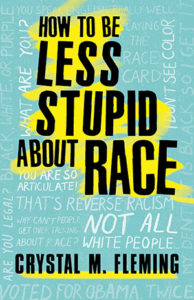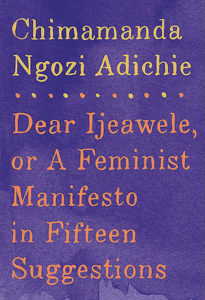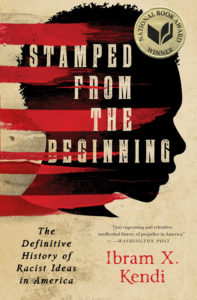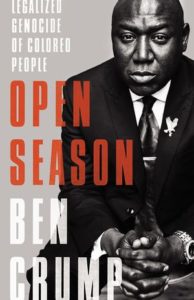As scholarly communicators, we know that we learn from each other and about each other through reading. There is no shortage of books about racism and anti-racism. Today and tomorrow we will feature reviews of books for your consideration in this time of listening and reflection. Please also read last week’s statement from the SSP Board of Directors and Co-Chairs of the Diversity, Equity & Inclusion Committee, “Reaffirming our Commitment to Diversity, Equity, and Inclusion.”
Jocelyn Dawson: How to Be Less Stupid about Race by Crystal Fleming, has a title that speaks to what seems to be, from a look at the  New York Times bestseller list, the collective goal of much of book-buying society today. Fleming’s book addresses, in an accessible, witty, and unsparing way, the unconscionable gaps in the teaching of race and history in the United States.
New York Times bestseller list, the collective goal of much of book-buying society today. Fleming’s book addresses, in an accessible, witty, and unsparing way, the unconscionable gaps in the teaching of race and history in the United States.
Fleming offers the reader crash courses in critical race theory, dismantling White supremacy, intersectionality, neoliberalism in the age of President Barack Obama, and the importance of listening to Black women. She writes, “as long as the endemic, systemic nature of white supremacy is successfully minimized or denied, as long as ‘conversations about race’ are mainly about individual attitudes, prejudice, or the actions of a few extremists, then attention is drawn away from the structures and pattern of racial inequality hiding in plain sight.”
Fleming wants us to stop thinking of White supremacy as neo-Nazis and White nationalists and instead turn our attention to the structures at the root of systemic racism: the laws, economics, and power dynamics within our institutions. The book is, as Fleming writes, a call to “become more knowledgeable about systems of oppression but also to leverage our knowledge to bring about some of the positive change we’d like to see.”
Steph Pollock: Chimamanda Ngozi Adichie’s Dear Ijeawele, or A Feminist Manifesto in Fifteen Suggestions is a short but poignant blueprint for feminism in the twenty-first century. Written as a letter to the author’s childhood friend with advice on how to raise a feminist  daughter, the book feels intimate and deeply personal – as if she is speaking directly to her reader.
daughter, the book feels intimate and deeply personal – as if she is speaking directly to her reader.
Adichie weaves her experience as an Igbo woman, born and raised in Nigeria, with her perspectives on feminism, encouraging her friend (and her readers) to challenge both Igbo and Western cultural norms about gender roles. In doing so, she offers a truly intersectional perspective on feminism.
I read Dear Ijeawele in one afternoon several years ago – it is just 63 pages long – but Adichie’s combination of wit, prose, and urgency have stayed with me. “I matter. I matter equally,” Adichie writes – a simple but powerful statement in this time of reckoning for racial justice, and an important reminder of Black women’s intersecting experiences.
You Can’t Touch My Hair (And Other Things I Still Have to Explain) by Phoebe Robinson is a wry, funny, and bold collection of essays on the experience of being a Black woman in America.
Robinson is a comedian perhaps best known as the creator and co-host of the 2 Dope Queens podcast and HBO series. In her book, Robinson not only speaks to her personal experiences as a Black woman but also uses humor and pop culture references to address topics like systemic racism, implicit bias, and the intersections of race and feminism.
Each essay is pointed and smart – “Welcome to Being Black” walks the reader through her experiences of being reminded by society that she is a Black person; “Dear Future Female President” outlines her screwball list of demands for the first female Commander-In-Chief. Throughout the book, Robinson uses humor to disarm her readers and call attention to Black women’s lived experiences in the United States. Her book is a good reminder of the value in leveraging comedy to speak truth to power, and she does it brilliantly.
Jessica Meylikhov: I was going to start this book review by recommending that every reader should forget what they knew about American history before they begin this book. I realized that was a mistake. Instead, readers should hold what they were taught in school and history books up to what Ibram X. Kendi explains in Stamped from the Beginning as clear evidence of how our society manipulates history for its own benefit.
 This carefully crafted timeline of racism in America is an awakening experience for those, like me, who were taught in a systemically racist society. It focuses on the misguided history and teachings that fuel today’s unconscious and conscious biases of many non-Black Americans. From the beginning of the slave trade to the present, the novel is succinct and careful in its narrative. Kendi eloquently teaches uninformed readers through examples of how America has meticulously integrated racist ideas into every decision, policy, and action throughout its history as a nation.
This carefully crafted timeline of racism in America is an awakening experience for those, like me, who were taught in a systemically racist society. It focuses on the misguided history and teachings that fuel today’s unconscious and conscious biases of many non-Black Americans. From the beginning of the slave trade to the present, the novel is succinct and careful in its narrative. Kendi eloquently teaches uninformed readers through examples of how America has meticulously integrated racist ideas into every decision, policy, and action throughout its history as a nation.
Kendi navigates the reader through history via five major figures or “tour guides” from the beginning of European colonization to present day. These five individuals are key players in the shaping of how we know and are taught about race today.
Kendi starts his chronological timeline with Cotton Mather, a Puritan minister in colonial New England, who expanded racist notions from England on the inferiority of Black people. Next, Thomas Jefferson’s complicated history of racism and slavery is paralleled with the story of Phyllis Wheatley, an enslaved poet who debunked Mathers’s then-embedded assumptions of black inferiority.
Kendi’s third guide is William Lord Garrison, an abolitionist who pushed for emancipation. Garrison’s chapters focus on the Civil War and other key characters like Frederick Douglas and Abraham Lincoln. W. E. B. Du Bois, the first African American to earn a doctorate, is the fourth guide, who’s life and career demonstrate emerging cultural shifts.
Finally, Angela Davis, the civil-rights activist, is Kendi’s final guide. Davis’s history is used by Kendi as platform for the tumultuous present history and the fight for racial equality and justice that is still happening today.
Stamped from the Beginning is a reflection of true history that allows its reader to learn and understand why our present society is so clearly unjust and unbalanced. Kendi highlights the fact that key players in history have forcefully controlled America’s narrative about race and how we as individuals and as a collective have the same amount of power to undo the inequality that our nation stands on.
Damita Snow: As one of the DEI Committee co-chairs, I like the idea of Scholarly Kitchen book reviews on racism. What I do not like is feeling that, as a Black cis female, it would be expected that I would write a book review on racism. Don’t get me wrong, I volunteered to do it and then I wrestled with it. I changed my titles twice, I volunteered to write two reviews but, in the end, chose only one title.
The title I chose was Open Season: Legalized Genocide of Colored People by Ben Crump. The title was intriguing. The author describes  colored people as anyone that is not a white male and are “those colored by their otherness.” Otherness being sexuality, ethnicity, gender, ableism, etc. Personally, that is not quite the definition that I expected.
colored people as anyone that is not a white male and are “those colored by their otherness.” Otherness being sexuality, ethnicity, gender, ableism, etc. Personally, that is not quite the definition that I expected.
Crump, an attorney, has seen his share of institutional racism, individual racism, and systemic racism. He has seen whom the justice system protects, and he feels that the “rest of us are on our own.” He gives many examples of how the justice system fails Black, Indigenous, and People of Color (BIPOC). When I chose the book, I did not know that Crump was the family attorney for Trayvon Martin (FL), Michael Brown (MO), Terence Crutcher (OK), George Floyd (MN), Breonna Taylor (KY), Ahmaud Arbery (GA) and others whose names did not make it into mainstream media. This was a difficult read for me and none of it is the fault of the author. Crump bases his opinions on the Constitution, American history, and his first-hand experiences as an attorney.
Open Season ends on a hopeful note. Crump believes that the U.S. is a great nation but that the systems in place are inherently racist. (I am no legal scholar so I would recommend you read the book for details.) He provides 12 steps that he believes will move the country forward. He also puts the responsibility on individuals, law makers, and communities. He writes “we must come together to destroy racism or racism will destroy America.” And, that “we are at a crossroads, a turning point in the country’s civil rights movement.” At this time, this statement could not be truer.
Open Season leaves me with many questions and one that I ask you….do you think Crump is correct that we are at a turning point in civil rights? I agree with that statement. If you agree, I want to hear what you are doing in your community during this pivotal time in U.S. history.
Angela Cochran: I would like to thank our contributors to the book reviews today as well as the chairs of the SSP DEI Committee, particularly Damita Snow for helping to recruit reviewers. Writing is a deeply personal experience and we are fortunate as readers to be able to use the narrative form as a way to challenge our beliefs and briefly step into the shoes of others. None of us can put aside who we are and fully experience the world through the eyes of others, but books allow us to imagine the world from another perspective. Non-fiction writing presents us with facts and narratives missing from the mainstream history books of our education. All that said, in this moment of looking for unity around racial justice, reading is the start, not the finish.
Tre Johnson’s Washington Post Op-Ed, “When Black People Are in Pain, White People Just Join Book Clubs,” reminds us that learning and listening is only effective when followed by action. Johnson writes:
The right acknowledgment of black justice, humanity, freedom and happiness won’t be found in your book clubs, protest signs, chalk talks or organizational statements. It will be found in your earnest willingness to dismantle systems that stand in our way — be they at your job, in your social network, your neighborhood associations, your family or your home. It’s not just about amplifying our voices, it’s about investing in them and in our businesses, education, political representation, power, housing and art.
Note: The style manual used for choices such as capitalization of terms is the Diversity Style Guide.


Discussion
9 Thoughts on "Connecting by Reading: A Selection of Books About Race and Racism, Part 1"
There is a great reading-list here:
https://www.charisbooksandmore.com/understanding-and-dismantling-racism-booklist-white-readers
(brought to my attention by Rita J. King on LinkedIn via Mark Allin on Facebook).
The book that has most influenced me is “Why I’m No Longer Talking to White People about Race” by British journalist Reni Eddo-Lodge. There is a long extract here:
https://www.theguardian.com/world/2017/may/30/why-im-no-longer-talking-to-white-people-about-race
Coincidentally, before seeing this post, I had sent the following message to members of my family about the books on race I had been involved with as an acquiring editor for over 45 years at two university presses, Princet0n and Penn State. Though most of these books are now only available print on demand, many of them are still remarkably timely, and that they are so is itself a reflection of how much more still needs to be done to achieve racial justice. Here is the lengthy message with the list of books attached and links to their web page4s.
In reflecting on the protests we have been witnessing in the streets for over two weeks now, one can only wonder how with so much progress made in the 1950s and 1960s with the Brown vs. Board of Education decision (1954) and the Civil Rights Act (1964) and Voting Rights Act (1965) there is still so much left to do.
As an editor working for two university presses over four decades I wanted to help promote positive change in society through the dissemination of ideas advanced by our best scholars. I now look back with pride on the publication of thirty books I acquired having to do with race, fifteen at each press, that are still amazingly relevant and timely today. A list of them is attached, with links to full descriptions at the two presses’ web sites.
On the one hand, I know these books contributed much to our understanding of race and racial problems. On the other hand, it is sobering to realize that many of the problems discussed in these books remain with us today, as our protestors are reminding us every day.
Let me add a few notes about some of these books, which span fields from philosophy and law to economics, political science, and sociology.
I worked with Jim Button, a political scientist at the University of Florida, over three decades to get his important empirical studies of economic inequality among blacks in the South published, the first two by Princeton, the last by Penn State. It is one of the rewards of an editor’s job to have a sustained relationship with an author over such a long period of time.
Marshall Cohen was the founding editor of the journal Philosophy & Public Affairs, which I helped get started at Princeton, with its first issue coming out in 1971. The journal was hugely influential, reaching individuals well beyond the academy (such as a supreme court justice in South Africa, who was among the subscribers), and it helped bring the field of philosophy back in touch with the real world that it had abandoned during the heyday or linguistic philosophy in the 1950s. Readers like this one were put together for classroom use from various issues of the journal. Others were on such subjects as
The Rights and Wrongs of Abortion and War and Moral Responsibility.
It is very interesting to see how two different societies approach the treatment of race, and Reginald Daniel’s book is eye-opening in that regard comparing Brazil and the US in their trajectories toward racial justice.
The US for a very long time defined being black as having just “one drop” of black blood in one’s ancestry, and this heritage weighed heavily on how race has been treated in this country, as Jim Davis so well explains. He was at one point called upon to be an expert commentator on Ophrah Winfrey’s show when she was interviewing some black people who had lived their lives “passing” as white—an experience explored in depth by Judy Scales-Trent, who lived that way herself.
The story of how African American communities organized businesses to help themselves out of poverty is told well by Jessica Gordon-Nehmhard.
The topic of race for a long while was ignored by philosophers, for reasons that are explored in the volume of “confessions” edited by Roy Martinez. Later, after I had retired from Penn State, the Press began publishing a new journal called The Critical Philosophy of Race edited by a Penn State faculty member, Robert Bernasconi.
Using one black man’s story as his lens, Allen Hornblum casts light on the horrific “scientific” experiments that were conducted by a University of Pennsylvania faculty member who was a dermatologist testing out new treatments on mostly black prisoners held in Philadelphia’s Holmesburg Prison. Hornblum wrote a more general book on the subject titled Acres of Skin. The University has never apologized for subjecting these prisoners to such horrible and painful experiments, even though I have written twice to its president, Amy Gutmann (a former Princeton provost for whom i sponsored two books published by Princeton), urging her to do so.
Linda Faye Williams wrote an extraordinary book that, among other things, showed that the Clinton Administration, contrary to what most people believe, turned back the clock on social and economic reforms favorable to blacks by many decades. This alone makes the book a real eye-opener. This is one of the most important books to have been published on race relations in the US in recent times, and it won many awards for that achievement. A Texas native, who attended segregated schools in her youth, Williams became a valued domestic political advisor to my Princeton classmate Bill Bradley when he ran for president. Alas, she died only three years after her book came out, in 2006, at age 57. Her alma mater, Rice, has set up a scholarship in her honor: https://magazine.rice.edu/2016/10/50years-williams/ (The first winner of this scholarship went on to get her Ph.D. at Princeton.) Linda was a wonderful person to work with, and I was privileged to call her my friend.
Finally, the volume Choosing Equality, which came out of a conference celebrating the 50th anniversary of the Brown vs Board of Education decision, is notable for its stirring Foreword written by none other than Joe Biden. I urge you all to read this piece (attached), which is as eloquent and moving as any speech given by Barack Obama on the subject of race and which should show you why, if you are not already convinced, that Joe Biden is the right man for the job of president at this critical juncture of our country’s histiory. Biden started his career as a civil rights lawyer and entered the US Senate to work for the advancement of civil rights. This essay is startling in its prescience. Consider these warnings:
“America is indeed a far better and richer country today because of the enlightenment delivered, in no small part, by the decision in Brown . . . . Yet it is that sense of accomplishment that is today, perhaps, the greatest enemy to equality. Having survived the civil rights movement and then reaped the benefits that struggle produced, we are inclined to believe that our work is done, that racial disparities no longer exist. But that simply is not true.
“Although we may no longer tolerate legal discrimination and segregation, we live, more than ever before, segregated lives in segregated neighborhoods. We worship in segregated churches, synagogues, and mosques. And a half-century after Brown, our children—still and yet again—attend segregated schools.
“Now is no time to rest on the accomplishments of yesteryear. We must remain vigilant in our efforts and true to the vision of legends like Dr. Martin Luther King Jr. and Shirley Chisholm and Thurgood Marshall and Barbara Jordan, all of whom knew what we all now know—namely, that America can only be great when all of its citizens are afforded an equal opportunity to grow and learn and themselves be great.”
Biden goes on to recount his meetings and eventual friendship with segregationist fellow senators like John Stennis and Strom Thurmond (for which he was criticized by Kamala Harris during the campaign), but the story Biden tells is one of redemption—how, by the end of their careers, these stalwart Southerns realized the errors of their ways and were happy ot step aside and let the younger generation’s leaders like civil rights activist Joe Biden take the country in a more progressive direction.
There are some wonderful quotable remarks here. I especially like this one: “Our sins have been many, and they run deep. Real equality—and our full redemption—remains elusive. It was much easier to get Rosa Parks a seat on the front of the bus than it has been to get Rosa Parks’s children a genuine opportunity to own the bus company.”
Biden is also prescient in foreseeing the rise of a more conservative judiciary, which he fears will take us in the wrong direction. “They are bright people,” he admits, “And they are honorable. But they are wrong.”
After reading this essay, can you really doubt that Fate brought forward Joe Biden as a presidential candidate at exactly the right time in our history for a leader whose whole life has been devoted to civil rights?
P.S. As editor of all these books, of course I have copies of them among the 4,000 books in my library, about 3,000 of which I worked on as editor. If any of you should want to borrow any of these books to read yourself, let me know and I’ll be happy to lend them out.
30 Books on Race Acquired and Edited by S. G.Thatcher
Princeton University Press (15)
James W. Button, Black Violence: Political impact of the 1960s Riots (1978) https://press.princeton.edu/books/paperback/9780691616179/black-violence
James W. Button, Blacks and Social Change: Impact of the Civil Rights Movement in Southern Communities (1989) https://press.princeton.edu/books/paperback/9780691602622/blacks-and-social-change
Marshall Cohen, ed., Equality and Preferential Treatment (1977) https://press.princeton.edu/books/paperback/9780691019888/equality-and-preferential-treatment
Leonard A. Cole, Blacks in Power: A Comparative Study of Black and White Elected Officials (1975) https://press.princeton.edu/books/paperback/9780691617398/blacks-in-power
Robert E. Conrad, ed., Children of God’s Fire: A Documentary History of Black Slavery in Brazil (1983; reissued by Penn State in 1994) http://www.psupress.org/books/titles/0-271-01321-4.html
James DeNardo, Power in Numbers: The Political Strategy of Protest and Rebellion (1985) https://press.princeton.edu/books/paperback/9780691611617/power-in-numbers
Stanley L. Engerman and Eugene D. Genovese, eds., Race and Slavery in the Western Hemisphere: Quantitative Studies (1975) https://books.google.com/books/about/Race_and_Slavery_in_the_Western_Hemisphe.html?id=06R9QgAACAAJ
Alan H. Goldman, Justice and Reverse Discrimination (1979) https://press.princeton.edu/books/paperback/9780691628004/justice-and-reverse-discrimination
John Hall Fish, Black Power / White Control: The Struggle of the Wood;awn Organization in Chicago (1973) https://press.princeton.edu/books/paperback/9780691618869/black-powerwhite-control
Gary P. Freeman, Immigrant Labor and Racial Conflict in Industrial Societies: The French and British Experience, 1945-1975 (1979) https://press.princeton.edu/books/paperback/9780691612386/immigrant-labor-and-racial-conflict-in-industrial-societies
Mary C. Karasch, Slave Life in Rio de Janeiro, 1808-1850 (1986) https://press.princeton.edu/books/paperback/9780691655574/slave-life-in-rio-de-janeiro-1808-1850
Herbert S. Klein, The Middle Passage:Comparative Studies in the Atlantic Slave Trade (1978) https://press.princeton.edu/books/paperback/9780691628301/the-middle-passage
Michael Reich, Racial Inequality (1981) https://press.princeton.edu/books/paperback/9780691615417/racial-inequality
Rebecca J. Scott, Slave Emancipation in Cuba: The Transition to Free Labor, 1860-1899 (1986; reissued by the University of Pittsburgh Press, 2000) https://upittpress.org/books/9780822957355/
Westen, Speaking of Equality: An Analysis of the Rhetorical Force of “Equallty” in
Moral and Legal Discourse (1990) https://press.princeton.edu/books/paperback/9780691600079/speaking-of-equality
Penn State University Press (15)
James W. Button, Barbara A. Rienzo, and Sheila Croucher, Blacks and the Quest for Economic Equality: The Political Economy of Employment in Southern Communities in the United States (2009) http://www.psupress.org/books/titles/978-0-271-03555-0.html
G. Reginald Daniel, Race and Multiraciality in Brazil and the United States (2006)
http://www.psupress.org/books/titles/0-271-02883-1.html
F. James Davis, Who Is Black? One Nation’s Definition (1991) http://www.psupress.org/books/titles/0-271-02172-1.html
Dan Flory, Philosophy, Black Film, Film Noir (2008) http://www.psupress.org/books/titles/978-0-271-03344-0.html
jessica Gordon-Nembhard, Collective Courage: A History of African American Cooperative Economic Thought and Practice (2014) http://www.psupress.org/books/titles/978-0-271-06216-7.html
Ronald L. Hayman and Leland Ware, eds., Choosing Equality: Essays and Narratives on the Desegregation Experience (2009) Foreword by Joe Biden http://www.psupress.org/books/titles/978-0-271-03433-1.html
John Higham, ed. Civil Rights and Social Wrongs: Black-White Relations Since World War II (1997) http://www.psupress.org/books/titles/0-271-01709-0.html
Allen M. Hornblum, Sentenced to Science: One Black Man’s Story of Imprisonment in America (2007) http://www.psupress.org/books/titles/978-0-271-03336-5.html
Elizabeth W. Kiddy, Blacks of the Rosary: Memory and History in Minais Gerais, Brazil (2005) http://www.psupress.org/books/titles/0-271-02693-6.html
Roy Martinez, ed., On Race and Racism in America: Confessions in Philosophy ( 2010)
http://www.psupress.org/books/titles/978-0-271-03639-7.html
Rebecca Reichmann, ed., Race in Contemporary Brazil: From Indifference to Inequality (1999) http://www.psupress.org/books/titles/0-271-01905-0.html
Kok-Chor Tan, Toleration, Diversity, and Global Justice (2000) http://www.psupress.org/books/titles/0-271-02067-9.html
Judy Scales-Trent, Notes of a White Black Woman: Race, Color, Community (1995) http://www.psupress.org/books/titles/978-0-271-01430-2.html
Alexis Shotwell, Knowing Otherwise: Race, Gender, and Implicit Understanding (2011)
http://www.psupress.org/books/titles/978-0-271-03763-9.html
Linda Faye Williams, The Constraint of Race: Legacies of White Skin Privilege in America (2003) http://www.psupress.org/books/titles/0-271-02253-1.html
One of the books from grad school that changed the way I see is the world is called “White Over Black,” by Winthrop Jordan. I majored in US history, with a focus on the colonial and federal periods, This book shattered me in ways I very much needed to be shattered.
It was published in 1969 and is (in my opinion) should be required reading for every US history major and AP history student in high school. (I know: at almost 700 pages, that is unlikely.) Jordan provides the basis for any meaningful understanding race relations in the US. The book challenges and over-turns so many of the convenient justifications and rationalizations for slavery that we’ve all encountered. Reading it was emotionally and intellectually difficult as it forced me to look anew at everything I thought I knew about American history.
It is well worth the time and energy, both mental and emotional.
One perspective on the book: https://s-usih.org/2015/11/the-legacy-of-jordans-white-over-black-1969/
Thanks so much for this Paula– the OIEAHC published Jordan’s _White Over Black_ in 1969 and Pulitzer prize-winning historian Annette Gordon-Reed described reading it as a teenager and deciding that she wanted to be a historian. There are few historians who have changed early American history the way that Prof. Gordon-Reed has and for that impact, which you describe so vividly, I’m so grateful. Also, we’ve made it open on JSTOR with our press partners at UNC.
The review of Open Season mentions George Floyd (MI). Sadly George died in Minneapolis, which is MN, not MI (Michigan).
I would definitely recommend “Americanah” also by Chimamanda Ngozi Adichie.


